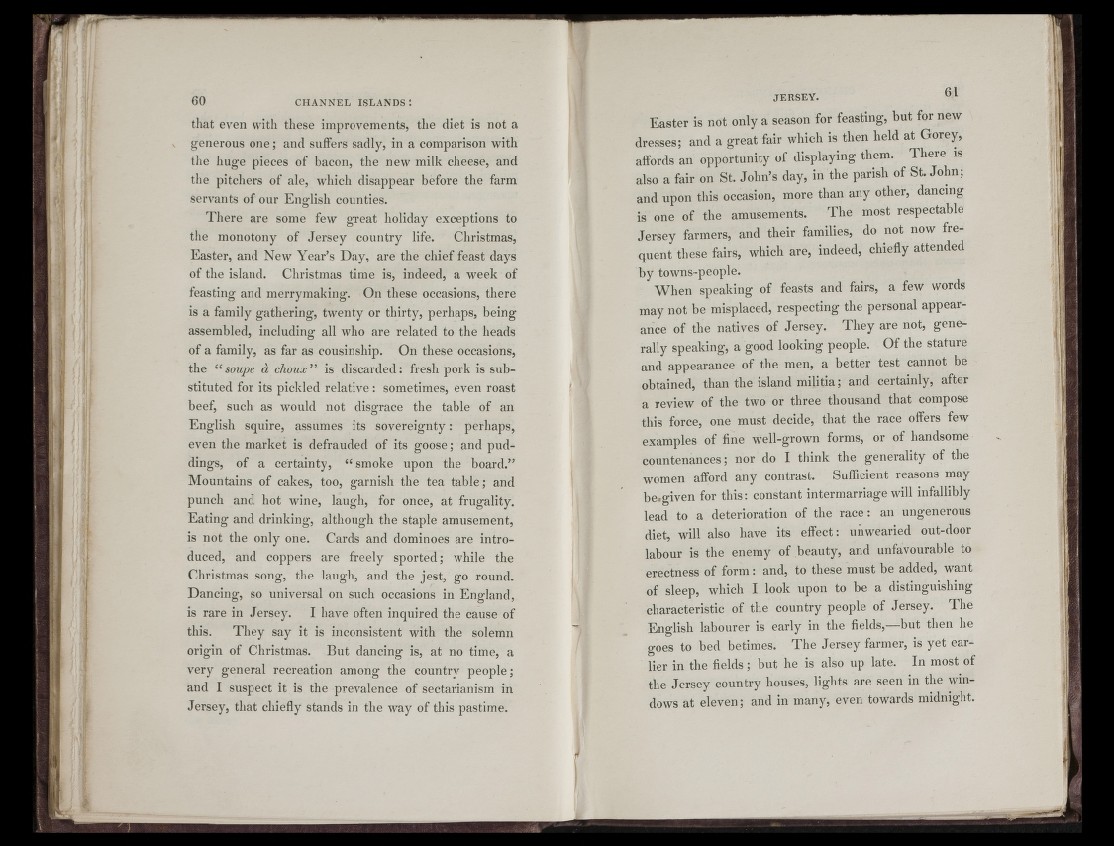
that ev'en with these improvements, the diet is not a
generous one; and suffers sadly, in a comparison with
tlie huge pieces of bacon, the new milk cheese, and
the pitchers of ale, which disappear before the farm
servants of our English counties.
There are some few great holiday exceptions to
the monotony of Jersey country life. Christmas,
Easter, and New Year’s Day, are the chief feast days
of the island. Christmas time is, indeed, a week of
feasting and merrymaking. On these occasions, there
is a family gathering, twenty or thirty, perhaps, being
assembled, including all Avho are related to the heads
of a family, as far as cousinship. On these occasions,
the soupe d choux'’ is discarded: fresh pork is substituted
for its pickled relative: sometimes, even roast
beef, such as would not disgrace the table of an
English squire, assumes its sovereignty: perhaps,
even the market is defrauded of its goose; and puddings,
of a certainty, “ smoke upon the board.”
Mountains of cakes, too, garnish the tea table; and
punch and hot wine, laugh, for once, at frugality.
Eating and drinking, although the staple amusement,
is not the only one. Cards and dominoes are introduced,
and coppers are freely sported; while the
Christmas song, the laugh, and the jest, go round.
Dancing, so universal on such occasions in England,
is rare in Jersey. I have often inquired the cause of
this. They say it is inconsistent with the solemn
origin of Christmas. But dancing is, at no time, a
very general recreation among the country people;
and I suspect it is the prevalence of sectarianism in
Jersey, that chiefly stands in the way of this pastime.
Easter is not only a season for feasting, but for new
dresses; and a great fair which is then held at Gorey,
affords an opportunity of displaying them. There is
also a fair on St. John’s day, in the parish of St. John;
and upon this occasion, more than any other, dancing
is one of the amusements. The most respectable
Jersey farmers, and their families, do not now frequent
these fairs, which are, indeed, chiefly attended
by towns-people.
When speaking of feasts and fairs, a few words
may not be misplaced, respecting the personal appearance
of the natives of Jersey. They are not, generally
speaking, a good looking people. Of the stature
and appearance of the men, a better test cannot be
obtained, than the island militia; and certainly, after
a review of the two or three thousand that compose
this force, one must decide, that the race offers few
examples of fine well-grown forms, or of handsome
countenances; nor do I think the generality of the
women afford any contrast. Sufficient reasons may
be,given for this: constant intermarriage will infallibly
lead to a deterioration of the ra c e : an ungenerous
diet, will also have its effect: unwearied out-door
labour is the enemy of beauty, and unfavourable to
erectness of form: and, to these must be added, want
of sleep, which I look upon to be a distinguishing
characteristic of the country people of Jersey. The
English labourer is early in the fields,—but then he
goes to bed betimes. The Jersey farmer, is yet earlier
in the fields; but he is also up late. In most of
the Jersey country houses, lights are seen in the windows
at eleven; and in many, even towards midnight.
mi'i